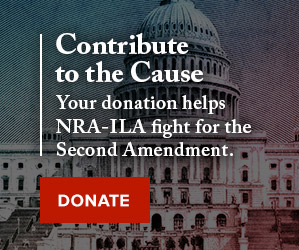NINTH CIRCUIT CLAIMS
THERE IS NO RIGHT TO ARMS
Last week, on December 5, the San Francisco-based Ninth Circuit Court of Appeals handed down a ruling in a challenge to California’s ban on so-called "assault weapons" that has created quite a stir in the debate over our Right to Keep and Bear Arms. The court dismissed the challenge in the case of Silviera v. Lockyer, but the most disturbing aspect of the ruling was that the court held that "the Second Amendment does not confer an individual right to own or possess arms." And while this statement flies in the face of reams of scholarly research, historical evidence, and rulings from other circuits that affirms the Second Amendment does protect an individual Right to Keep and Bear Arms, the text of the ruling includes exceptionally questionable elements.
Although an overwhelming amount of research from highly respected scholars, historians, and constitutional experts supports the fact that the Second Amendment does, indeed, protect an individual right, the Ninth Circuit chose to reference "research" from the widely discredited Michael Bellesiles. Bellesiles, of course, is the historian forced to resign his position as a professor at Emory University after a committee found him "guilty of unprofessional and misleading work" in important areas of his controversial book, "Arming America." The committee also wrote, "We are seriously troubled by Professor Bellesiles’s scholarly conduct," and, "the failure to clearly identify his sources moves into the realm of falsification." And just today, Columbia University announced its Board of Trustees had voted to revoke the Bancroft Prize Bellesiles had been awarded for "Arming America" in 2001. The Bancroft Prize is considered by many to be the ultimate honor an American historian can receive, and this revocation is surely the final nail in the coffin of Bellesiles`s credibility. But the Ninth Circuit seemed to have no problem citing Bellesiles.
Also found in the ruling is an inference that those who share the view that the Second Amendment protects an individual right are comparable to "the type of extremist ‘militia’ associated with Timothy McVeigh and other militants with similar anti-government views." However, poll after poll indicate the vast majority of Americans share this alleged "extremist" view, and the Ninth Circuit failed to recognize that other courts support the individual Right to Keep and Bear Arms, including the Fifth Circuit Court of Appeals (as held in the case of U.S. v. Emerson) and the Supreme Court of the United States (as noted in the case of U.S. v. Verdugo-Urquidez).
But this outrageous ruling should come as no real surprise. The Ninth Circuit is widely regarded as the most extreme in the country, and its rulings are overturned by the Supreme Court of the United States more often than any other. In 1997, the Supreme Court overturned 28 of 29 cases reviewed from the Ninth Circuit, and at one point this year, the high court had overturned 12 out of 17 reviewed cases from the Ninth, including one rare day in jurisprudence when three cases were overturned. And, of course, this is the same court that, earlier this year, ruled the Pledge of Allegiance was unconstitutional because of the words "under God." As could be expected, this latter ruling promulgated a deafening outcry of opposition from the vast majority of Americans. Lawmakers from both sides of the aisle described the ruling with such unflattering terms as "nuts" and "stupid," and the U.S. Senate quickly responded by passing a resolution "expressing support for the Pledge of Allegiance" on a 99-0 vote. Perhaps realizing it had made a grave error, the Ninth Circuit quickly suspended its ruling, so the Supreme Court may not have an opportunity to overturn this particularly egregious edict.
The Ninth also ruled earlier this year that its interpretation of Idaho intoxication laws led it to believe drivers could operate motor vehicles while high on marijuana in that state, provided they do not drive erratically and can pass a field sobriety test. And a ruling by the same court in the case of U.S. v. Knight would have, according to Los Angeles Police Officer Jack Dunphy, "denied police officers a valuable tool in their efforts against crime and villainy." Dunphy, writing for National Review Online, was referring to the court’s ruling that a warrantless search of a vandalism suspect who was on probation for a previous offense was unconstitutional, even though one of the routine conditions for such a probationer is that he "[s]ubmit his . . . person, property, place of residence, vehicle, personal effects, to search at anytime, with or without a search warrant, warrant of arrest or reasonable cause by any probation officer or law enforcement officer." Upon review by the Supreme Court, however, the Ninth was again reversed, and reversed unanimously. Dunphy—who refers to the Ninth as a court that "says a lot of things, few of which, thank God (!), are taken seriously outside their own chambers"—described the 9-0 decision as being "peppered with little barbs" that were "tantamount to asking, ‘How did these pinheads ever pass the bar in the first place?’"
Of course, gun-ban extremists have embraced the ruling in Silviera v. Lockyer as "remarkable" and "spectacular," as would be expected. But the fact that this particular court has been so historically out of step with both mainstream America and the Supreme Court should only serve to highlight just how desperate and out of step is the anti-gun movement. What happens next with this particular case remains to be seen, but you can rest assured we will follow it and whatever effect it has on our Right to Keep and Bear Arms very closely.
SUPREME COURT RULES
<align=center>ON SEEKING "RELIEF FROM DISABILITIES"
The Supreme Court of the United States ruled on Tuesday that citizens who are prohibited from purchasing or possessing a firearm under federal law cannot seek relief from this prohibition directly through the courts. The case, U.S. v. Bean, involved a licensed gun dealer who was convicted of a felony offense in Mexico when he entered the country with approximately 200 rounds of ammunition that had not been removed from his vehicle. Bean asserted his assistants had failed to follow his instructions to remove the ammunition. And while this non-violent crime is no longer classified a felony in Mexico, the fact that it was at the time of conviction meant Bean fell under the U.S. federal prohibition for purchasing or possessing firearms.
After completing his sentence, Bean attempted to return to his livelihood as a licensed firearm dealer, which meant the federal prohibition on his ability to lawfully purchase and possess firearms would need to be addressed. In accordance with federal law, Bean asked the Bureau of Alcohol, Tobacco and Firearms (BATF) for "relief from disabilities"—a procedure first established in 1968 as a matter of constitutional principle whereby non-violent felons could petition the government to remove the restrictions on firearms. The program was codified in 1986 as part of the Firearms Owners’ Protection Act. In 1992, however, Congress eliminated funding for this program, which effectively ended its implementation. When it was clear the BATF was not going to act on his petition, Bean sought relief through the courts, which federal law allows if a petition is denied. Both the federal circuit court and the Fifth Circuit Court of Appeals agreed he was entitled to a judicial review.
The Supreme Court, however, disagreed, finding that a very technical interpretation of federal law required an actual denial by BATF before an individual could seek relief through the courts. Though the Court ruled non-violent felons can be denied the ability to simply seek "relief from disabilities" because of funding issues, it is important to remember that this case had little, if anything, to do with the Second Amendment. It was neither argued on Second Amendment grounds, nor did any of the rulings (trial through Supreme Court) hinge on the Second Amendment.
LANDRIEU WINS SENATE RACE
<align=center>AND EMBARRASSES GUN-BAN LOBBY
Incumbent U.S. Senator Mary Landrieu (D-La.) held off NRA-PVF-endorsed challenger Suzanne Haik Terrell (R) in the race for the final Senate seat to be decided this election year. And while one would normally see the anti-gun extremists at the gun-ban lobby crowing about this race, there’s little that organization can be happy about. While the anti-gun Brady Campaign for the Prevention of Handgun Violence, formerly known as HCI, contributed $1,000 to the Landrieu for Senate campaign, we applaud Senator Landrieu for rejecting the contribution and for donating that money to the Louisiana Department of Wildlife & Fisheries Foundation, where it will be used to encourage Louisianians to hunt, fish, and enjoy the "Sportsmen’s Paradise." Senator Landrieu has expressed her commitment to stand with NRA members and other law-abiding gun owners and sportsmen in Louisiana on important Second Amendment issues such as allowing the federal "assault weapons" ban to sunset, preserving gun shows, protecting gun manufacturers from predatory lawsuits, and calling for a study of "ballistic fingerprinting" before millions of dollars in law enforcement resources are squandered on a gun registration scheme. Senator Landrieu has shown that she is willing to listen to the concerns of Louisiana’s Second Amendment community, and we look forward to working with her in the 108th Congress.
HOMELAND SECURITY ACT
<align=center>AND BLACK AND SMOKELESS POWDERS
There has been some misinformation circulating on the Internet concerning the new Safe Explosives Act within the Homeland Security Act of 2002 signed into law by President Bush on November 25. Rest assured, this law does not require a license for buyers of reloading components. In fact, existing federal explosive laws and regulations make exceptions for black and smokeless powders, and the new law did not amend those exceptions. Smokeless powder designed for use in small arms is considered an "ammunition component" rather than an explosive, and black powder is not considered an explosive when sold in quantities of less than 50 pounds and used for sporting, recreational, or cultural purposes in antique, replica, or muzzle loading firearms. Under these conditions, neither are subject to existing explosive laws or to new requirements in the Act. U.S. Senator Orrin Hatch (R-Ut.), senior Republican on the Senate Judiciary Committee and now incoming chairman, worked closely with NRA to ensure that no language was included that would jeopardize hand loaders or black powder shooters. Our thanks go out to Senator Hatch for his leadership in safeguarding the current provisions surrounding black and smokeless powders for gun owners.
STAY INFORMED
<align=center>& HELP SAVE ILA FUNDS
If you have an e-mail address, but you still receive the NRA-ILA Grassroots Alert every Friday via your fax machine, we encourage you to switch over to our e-mail system. We can send e-mail at virtually no cost, while each fax incurs the cost of a long distance call, not to mention your cost in paper. E-mail also allows you more flexibility in relaying our information to others. If you would like to switch to e-mail delivery, just click here. Once you start receiving our alerts via e-mail, call the Grassroots Division at (800) 392-8683, and let us know we can take you off the fax system.
A LOOK AT THE STATES
MISSISSIPPI:
Mississippi has now become the 30th state to pass legislation protecting the lawful firearms industry. Last week, House Bill 19, a tort reform package that includes NRA-backed firearms lawsuit preemption language, was signed into law by Governor Ronnie Musgrove (D). Your phone calls were critical in creating momentum each time the proposal stalled. Thank you to everyone who contributed to this victory!



















